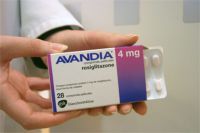Diabetes drug Avandia to come off U.S. market
U.S. government health officials said Monday the widely used diabetes drug Avandia should come off the market. Authorities insist on that according to studies of the influence of the drug on the increased risk of heart attacks.

That risk, combined with the drug's lack of unique short-term benefits in helping diabetics control blood sugar, means continued sales are not justified, Food and Drug Administration scientist Dr. David Graham told the panel of outside experts.
The manufacturer, GlaxoSmithKline PLC, argued that there is no increased risk, citing its own analyses of studies of Avandia, also called rosiglitazone.
"The number of myocardial infarctions is small, the data are inconsistent and there is no overall evidence rosiglitazone is different from any other oral antidiabetes agents," said Dr. Ronald Krall, the company's senior vice president and chief medical officer.
The FDA convened the experts to consider whether Avandia should be restricted to use in select patients and branded with prominent warnings or removed altogether from sale. Previously, the FDA had said information from dozens of studies pointed to an increased risk of heart attack.
The FDA is not required to follow the advice of its advisory committees but usually does.
Millions with Type 2 diabetes use Avandia to control blood sugar by increasing the body's sensitivity to insulin. That sort of treatment has long been presumed to lessen the heart risks already associated with the disease, which is linked to obesity. News that Avandia might actually increase those risks would represent a "serious limitation" of the drug's benefit, according to the FDA.
Graham was backed up by his boss, Dr. Gerald Dal Pan, who said the balance between the risks and benefits of Avandia did not favor the drug. But another agency official urged the panel to keep an open mind.
"It is important that the committee understand there is a fundamental disagreement within (the FDA's drugs office) on the scientific conclusions that should be drawn," said Dr. Robert Meyer, head of the FDA office that reviews new diabetes drugs.
That split exposed a rift between officials charged with approving new medicines and those who monitor their safety once on the market.
Graham, who has long been outspoken on safety issues with Vioxx and other drugs, said allowing Avandia sales to continue would be unacceptable given the expectation that it should lower the heart risks already associated with the disease.
"It makes no medical sense and violates the principle taught us all in medical school ... 'First, do no harm,"' Graham said. But Meyer reminded panelists of the value of having drug choices to treat diabetes and said other drugs may present different risks.
The FDA moved up the date of Monday's meeting following the May publication of a study in The New England Journal of Medicine that generated new concerns about Avandia's safety. The analysis of 42 studies revealed a 43 percent higher risk of heart attack for those taking Avandia compared with people taking other diabetes drugs or no diabetes medication.
Glaxo, meanwhile, said its own data show no increase in heart risks with Avandia compared with other diabetes drugs, including Actos. The FDA's Graham, in his presentation, said Avandia does increase heart risks - something Actos, from Takeda Pharmaceuticals, does not do.
The company recommended continuing long-term studies of the drug and updating the label to inform doctors and patients of what's known so far about any heart risks. Graham said waiting for more results could subject as many as 2,200 people a month to serious side effects from the drug.
Separately, the FDA is working to add so-called "black box" warnings to the labels of both Avandia and Actos to caution patients about the increased risk of heart failure associated with the drugs. That risk is separate from those discussed Monday.
Congress has pointed to Avandia as evidence of FDA's fumbling of safety problems that emerge long after drugs win agency approval. The House and Senate are at work on legislation to overhaul the FDA.
Subscribe to Pravda.Ru Telegram channel, Facebook, RSS!


